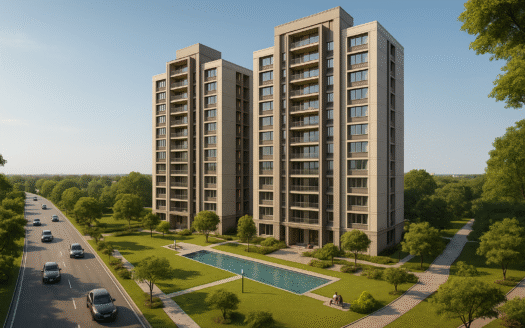Introduction
Buying your first home is a significant milestone in anyone’s life—an exciting step that symbolizes stability, growth, and new beginnings. However, this journey is often accompanied by a fair share of confusion and questions. From understanding how home loans work to deciphering legal terms in property documents, first-time homebuyers face a steep learning curve. Add to that the emotional pressure of making a long-term commitment, and it’s no wonder many feel overwhelmed.
Every buyer wants to make the right choice, but the path to homeownership involves several important decisions: How much should I borrow? Is now the right time to buy? What legal checks are essential? Should I invest in a ready-to-move property or an under-construction flat? These are just a few of the questions that can stall or complicate the process.
In this comprehensive guide, we answer the top 20 frequently asked questions that every first-time homebuyer in India typically asks. With practical tips, clear explanations, and helpful comparisons, this blog aims to eliminate confusion and equip you with the confidence to make informed, smart decisions on your home-buying journey.
Key Takeaways
- Financial Readiness: Understanding down payments, EMIs, and loan eligibility is crucial.
- Legal Aspects: Ensuring proper documentation, title verification, and RERA compliance.
- Property Selection: Choosing between apartments, independent houses, and gated communities.
- Government Benefits: Exploring first-time homebuyer schemes and tax benefits.
- Investment Potential: Evaluating resale value and long-term appreciation.
- Loan Options: Understanding fixed vs. floating interest rates and home loan tenures.
- Hidden Costs: Recognizing expenses like maintenance charges, GST, and stamp duty.
 Frequently Asked Questions (FAQs)
Frequently Asked Questions (FAQs)
1. What is the first step in buying a home?
The first step is to assess your financial readiness. This includes:
- Evaluating your savings for down payment
- Checking your credit score
- Estimating loan eligibility
- Setting a realistic budget
It’s also wise to get a home loan pre-approval, which gives you clarity on your purchase range and improves your credibility with sellers.
2. How much down payment is required for buying a home in India?
Typically, buyers are expected to contribute 10% to 25% of the property value as a down payment. The exact percentage depends on the lender and your credit profile.
| Property Price | Minimum Down Payment (Approx.) |
| ₹40 lakhs | ₹4-10 lakhs |
| ₹70 lakhs | ₹7-17.5 lakhs |
3. How do I check my home loan eligibility?
Eligibility depends on:
- Monthly income
- Credit score (preferably 750+)
- Age and employment status
- Existing financial liabilities
Use online home loan eligibility calculators for quick estimates.
4. Should I go for a fixed or floating interest rate?
- Fixed Rate: EMI remains the same; ideal for long-term stability.
- Floating Rate: Changes with market rates; could result in savings if rates fall.
Your choice depends on your risk appetite and interest rate forecasts.
5. What documents are required for a home loan?
For salaried individuals:
- PAN and Aadhaar
- Salary slips (last 3 months)
- Bank statements (6 months)
- Form 16 or IT returns
For self-employed:
- Business proof
- ITR (last 2 years)
- GST returns
6. What are the hidden charges while buying a home?
- Stamp duty and registration
- Legal and documentation fees
- Maintenance deposit
- Clubhouse or amenity charges
- GST (for under-construction properties)
7. What is RERA, and why is it important?
RERA (Real Estate Regulatory Authority) ensures transparency in property transactions. It:
- Mandates project registration
- Protects buyer interests
- Ensures timely possession
Always choose RERA-registered projects.
8. Is it better to buy a ready-to-move-in or under-construction property?
| Aspect | Ready-to-Move | Under-Construction |
| Possession Time | Immediate | 1-3 years approx. |
| GST Applicable | No | Yes (5% approx.) |
| Price | Slightly higher | Relatively lower |
| Risk of Delay | None | Present |
9. What are the tax benefits of buying a home?
- Section 80C: Deduction up to ₹1.5 lakh on principal repayment
- Section 24(b): Deduction up to ₹2 lakh on interest
- Additional benefits under Section 80EE/80EEA for first-time buyers
10. How do I choose the right location for my home?
Consider connectivity, infrastructure, job opportunities, safety, social amenities, and future development potential before deciding.
Important Factors in Home Buying
| Factor | Why It Matters |
| Location | Affects resale value and convenience |
| Builder Reputation | Ensures quality and timely delivery |
| Loan Interest Rate | Determines EMI affordability |
| Future Development | Influences property appreciation |
| Legal Clearance | Avoids disputes and legal hassles |
| Gated Community vs. Independent House | Security, amenities, and resale potential |
11. What is an encumbrance certificate?
This certificate verifies that the property has no legal or financial liabilities (such as loans or disputes). It is essential for loan approval and resale.
12. How do I verify the legal status of a property?
- Check the title deed
- Ensure RERA registration
- Ask for the encumbrance certificate
- Verify building approvals and NOCs from local authorities
13. What is a property’s carpet area, built-up area, and super built-up area?
- Carpet Area: Usable floor space inside walls.
- Built-up Area: Carpet area + walls & balconies.
- Super Built-up Area: Built-up area + common areas.
14. Can NRIs buy property in India?
Yes. NRIs can buy residential or commercial property in India, except agricultural land or farmhouses. Home loans are also available through Indian banks.
15. What is a sale agreement, and when is it signed?
A sale agreement is a legal document outlining the terms and conditions of the transaction. It is signed after paying the booking amount and before property registration.
16. How does property registration work?
- Pay stamp duty and registration charges (varies by state)
- Visit the sub-registrar office with ID and property documents
- Register the sale deed to legally transfer ownership
17. Is it wise to take a joint home loan?
Yes. Joint loans (with spouse or parent):
- Improve eligibility
- Share EMI burden
- Offer tax benefits to both applicants
18. What is a home loan sanction letter?
A sanction letter confirms that your home loan is approved. It mentions:
- Approved amount
- Interest rate
- Loan tenure
- Terms and conditions
It’s valid for a limited period (usually 3-6 months).
19. Can I prepay my home loan?
Yes, most lenders allow partial or full prepayment. Some benefits include:
- Lower total interest paid
- Early closure of loan
Note: Check if there are prepayment charges (usually applicable on fixed-rate loans).
20. What are the common mistakes first-time buyers make?
- Not checking RERA or legal documents
- Overstretching budget
- Ignoring hidden costs
- Choosing poor location
- Not understanding loan terms
Avoiding these can save you time, money, and stress.
Pro Tip:
Always opt for home insurance to protect your property against natural disasters, theft, and damages.
Conclusion
Purchasing your first home is a life-changing event, and being equipped with the right knowledge can make all the difference. By understanding the financial, legal, and practical aspects of homebuying, you can approach the process with confidence and clarity. This FAQ guide was designed to answer the most common doubts first-time buyers face, from budgeting and documentation to choosing the right property type and loan options.
Remember, preparation is key. Take your time to research, consult professionals when needed, and don’t rush into any decisions. Whether you’re buying a compact flat or a spacious family home, the journey is just as important as the destination. With the right guidance, like the one offered by Get My Ghar, finding your dream home can be a seamless and rewarding experience.
Still have questions? Reach out to the experts at Get My Ghar to get personalized assistance and discover properties that truly match your lifestyle and budget.












